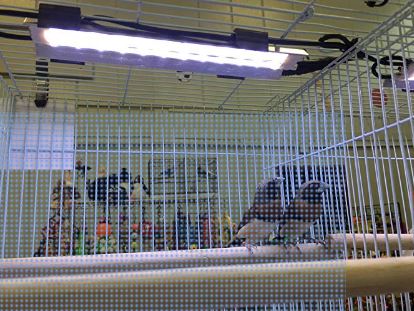Location of Canary Cages
Should NOT Be Overlooked.
Location of canary cages can be as important as the food canaries eat and the air they breath.
In the world of pet canaries, selecting the perfect cage location isn't just about aesthetics—it's a critical factor that directly impacts the health, happiness, and well-being of these beloved birds.
From providing the right amount of natural light to minimizing stress-inducing factors, the location of your canary's cage plays a pivotal role in their daily lives.
In this article, we delve into the importance of canary cage location and explore the key considerations to keep in mind when determining the optimal spot for your feathered friend's habitat.
Whether you're a seasoned canary enthusiast or a novice bird owner, understanding the significance of cage location is essential for creating a nurturing and enriching environment for your pet canary.

CANARY CAGES LOCATION
Some of the main things to consider when choosing a location for your canary bird's cage are...
- Direct Sunlight
- Cool Drafts
- Toxic Fumes
- Dangerous Pets
- Active Children
- Pets and Predators
Cages can be placed on a piece of furniture like a table or book case or can be used with a stand. However, try to place the cage at eye level or higher so humans won't always be towering over the little guy.
Beware of windows, kitchens, patios, and doors.
Some Recommended Canary Cages...
SUNLIGHT AND CANARY CAGES LOCATION
The location of a canary cage is crucial when considering both natural and artificial light, as these lighting factors directly impact the physical health and behavioral well-being of the birds.
Natural light plays a significant role in regulating the canary's circadian rhythm, influencing their sleep patterns, breeding behavior, and overall vitality.
Placing the cage in an area with access to natural sunlight helps ensure that canaries receive adequate exposure to sunlight, which is essential for maintaining their physiological processes and promoting vitamin D synthesis.
On the other hand, artificial light can serve as a supplemental source of illumination, particularly during periods of low natural light or in indoor environments with limited access to sunlight.
When selecting a location for canary cages, it's essential to strike a balance between natural and artificial light, providing sufficient exposure to sunlight while supplementing with artificial lighting as needed to create a consistent day-night cycle for the birds.
By prioritizing both natural and artificial lighting considerations, canary owners can create an optimal environment that supports the health, behavior, and overall well-being of their feathered companions.
A little direct sunlight is OK and a good part of canary care. It's a good source of Vitamin D production and your canary will enjoy it.
But if your cage is next to a window, watch closely for any sign of overheating or symptoms of illness.
If your canary starts sitting still with its mouth open like a panting dog or if he starts holding his wings out from his body you know its too hot.
Over heating may cause your canary to begin his molt early. And that means he'll stop singing for a while.
A little sunlight every day is good for bone density, hormone production, better mood, and overall good health.
Unfortunately, it's not always possible to provide pure sunlight for our birds. Sunlight filtered through a glass window does not provide the same effect. And opening the window or putting the cage outside offers up its own problems.
Using a full spectrum light is a good idea. It's not the same as REAL sunlight but it's pretty close.
CANARIES AND DRAFTS
It is crucial to pay attention to drafts, especially cool drafts, with a pet canary because these birds are highly sensitive to changes in temperature and air currents.
Drafts can cause rapid fluctuations in temperature, leading to stress, respiratory issues, and even illness in canaries. Their delicate respiratory systems make them particularly susceptible to cold air, which can result in respiratory infections like pneumonia or bronchitis.
Additionally, cool drafts can disrupt the canary's ability to regulate its body temperature, potentially leading to a compromised immune system.
Therefore, it's essential to ensure that the canary's cage is placed in an area free from drafts and to avoid exposing them to sudden changes in temperature to maintain their health and well-being.
Make sure there are no drafts (or "droughts" if you prefer) in the vicinity of cage. A canary bird can stand cold temperatures but absolutely positively cannot survive a cool draft.
TOXIC POISONING
It's crucial to pay attention to chemicals in regards to pet canaries in the house because these birds have highly sensitive respiratory systems and are particularly vulnerable to airborne toxins.
Exposure to chemicals such as household cleaners, aerosol sprays, perfumes, and pesticides can lead to respiratory irritation, respiratory distress, and even poisoning in canaries.
Additionally, fumes from cooking appliances, such as non-stick cookware or overheated Teflon pans, can release toxic gases that are harmful to birds.
Therefore, it's essential to use non-toxic and bird-safe cleaning products, avoid spraying aerosols or perfumes near the canary's cage, and ensure proper ventilation in areas where chemicals are used.
By minimizing exposure to harmful chemicals, canary owners can help protect their feathered companions from respiratory issues and ensure their health and well-being.
Canaries are sensitive to fouled air and chemicals.
Smoke from a hot non-stick frying pan can kill your canary. Also be careful with...
- bug sprays
- scented candles
- smoke
- deodorizers
- strong smelling cleaning solutions like oven cleaners and ammonia.
For these reasons, cages should not be placed in the kitchen.
You may have to move your bird and canary cage to another room or outside while cooking or using strong cleaning solutions.
If you're a smoker, QUIT! Or at least try and locate the cage in an area that gets little to no smoke.
I highly recommend a high quality air purifier to be placed near your birds cage.
PETS AND CANARY CAGE LOCATION
It's essential to pay attention to pets such as cats and dogs in regards to pet canaries in the house due to the potential risk of predation or harm to the birds.
Cats and dogs are natural predators and may view canaries as prey, posing a significant threat to their safety if they are allowed unsupervised access to the canary's cage or living area.
Even if pets are well-behaved and not actively aggressive towards the canaries, their mere presence can cause stress and anxiety in the birds, which can negatively impact their health and well-being.
Therefore, it's important to supervise interactions between pets and canaries, keep them separated when necessary, and provide secure housing to ensure the safety and security of the birds.
If you have dogs or cats or, heaven forbid a ferret--Ferrets love to eat tiny tender canary nuggets and they WILL find a way to get inside the cage--please place your canary's cage in a safe place and keep it high.
Also...
Most people don't think there little pooch would ever try to get a caged canary but those hunting instincts can kick in and look out!
So place canary cages out of reach and your canary will live a long happy life and sing its little heart out for you.
CHILDREN AND CANARIES
It is important to pay attention to young children in regards to pet canaries in the house due to the delicate nature of these birds and the potential for accidental harm.
Young children may not fully understand how to handle or interact with pet canaries safely, which can lead to situations where the birds are mishandled, startled, or even injured.
Additionally, young children may be prone to loud noises, sudden movements, or unpredictable behavior, which can cause stress and anxiety in canaries.
Therefore, it's essential to supervise interactions between young children and canaries closely, teach children how to handle the birds gently and respectfully, and establish clear boundaries to ensure the well-being of both the children and the birds.
CANARY BIRDS OUTSIDE
Putting a canary and cage outside can provide the bird with exposure to natural sunlight, fresh air, and a stimulating environment, which can promote physical and mental well-being.
Outdoor time allows canaries to experience natural daylight cycles, which are essential for regulating their circadian rhythm and maintaining overall health.
Additionally, outdoor enrichment, such as exposure to natural sights and sounds, can help prevent boredom and encourage natural behaviors like singing and foraging.
However, there are also significant dangers associated with placing a canary and cage outside. Predators, such as cats, dogs, or birds of prey, pose a serious threat to the safety of the canary.
Additionally, exposure to extreme weather conditions, including temperature fluctuations, strong winds, rain, and direct sunlight, can be harmful to the bird's health. Other risks include exposure to airborne pollutants, mosquito-born parasites, and potential escape if the cage is not securely positioned or maintained.
Overall, while outdoor time can be beneficial for canaries, it's essential to weigh the risks carefully and take precautions to ensure the safety and well-being of the bird. This includes providing a secure and predator-proof enclosure, monitoring weather conditions closely, and supervising outdoor time to prevent accidents or harm.
Canary cages--to our canary's delight--can be placed outside on occasion. The fresh air will do him good. Just be aware of cats, wild birds, or other predators in the area.
And when I say "predators", I also mean...mosquitoes! Mosquitos carry and spread Canary Pox. A fatal disease among canaries. A mosquito bite can kill your canary.
Also, beware of the heat from the sun. Direct sun--even on cool days--can quickly overheat your canary. A cloth should be placed over part of canary cages when outside so he can get in the shade if he wants.
Those that keep their canaries outside for long periods of time use a screen on their canary cages that prevents insects form entering. Large aviaries will keep finches in the cages with their canaries for added insurance--Finches eat mosquitoes.
Your safest bet is to just leave your bird's cage indoors and use a UV lamp to simulate sunlight.
Recommended Pet Canary Supplies...
DAYLIGHT HOURS
Your canary's hormones are regulated by light.
Canary cages should be covered with a dark cloth at sundown and uncovered at sunrise to make sure your canary is getting the correct number of daylight hours throughout the year.
Very long days with lots of light could trigger an early molt and that means no singing, and possibly poor health.
|
Make sure your canary has good and comfortable cage furnishings. He doesn't want a bean bag and a color TV but there are some things he DOES want...Click here for information on cage furnishings.











